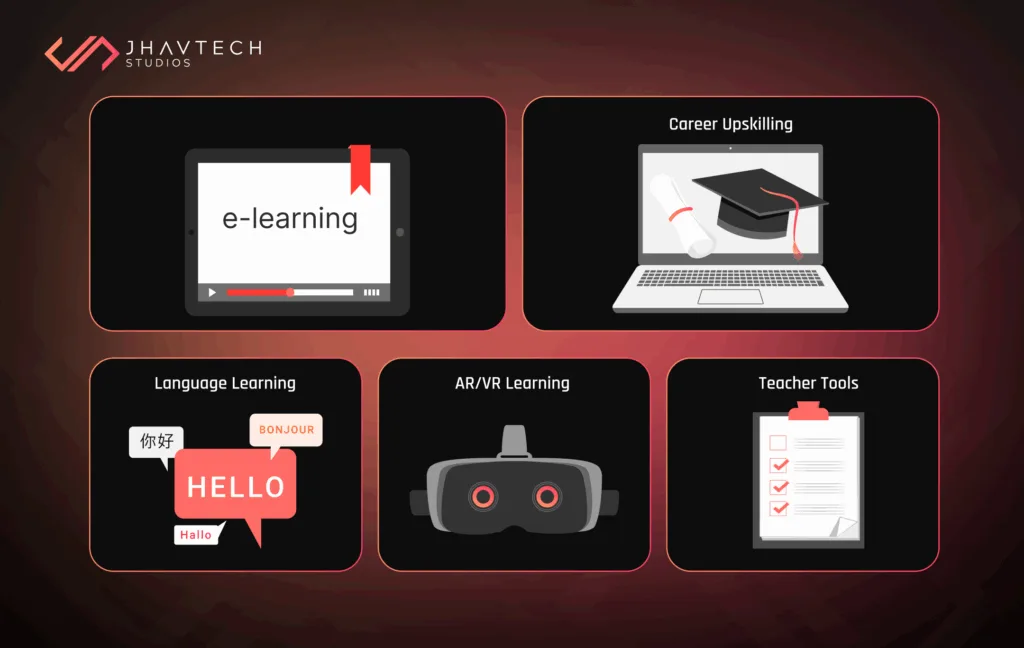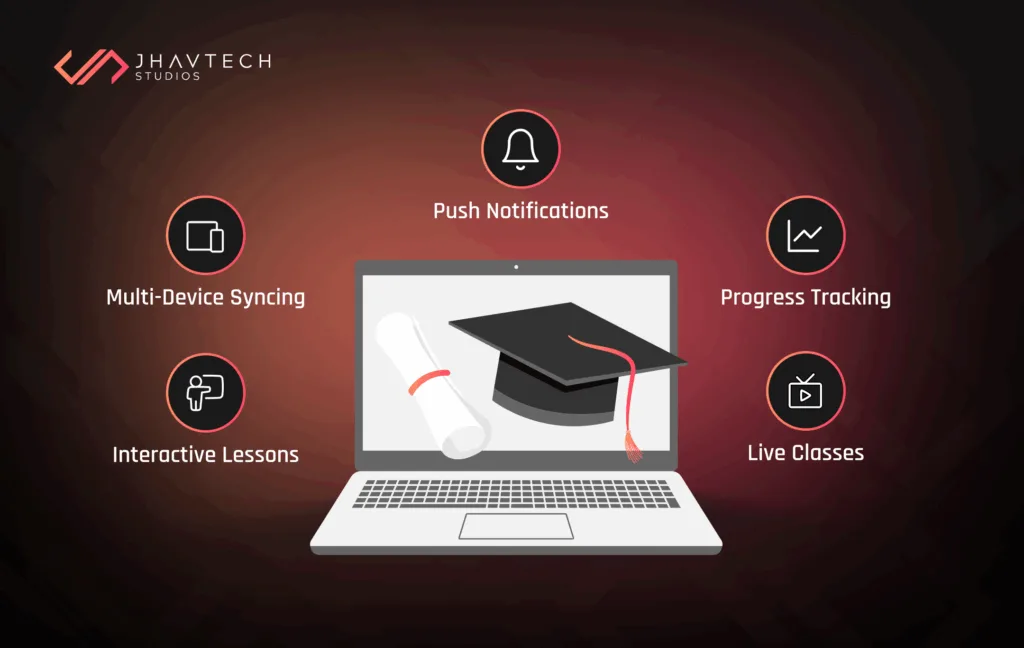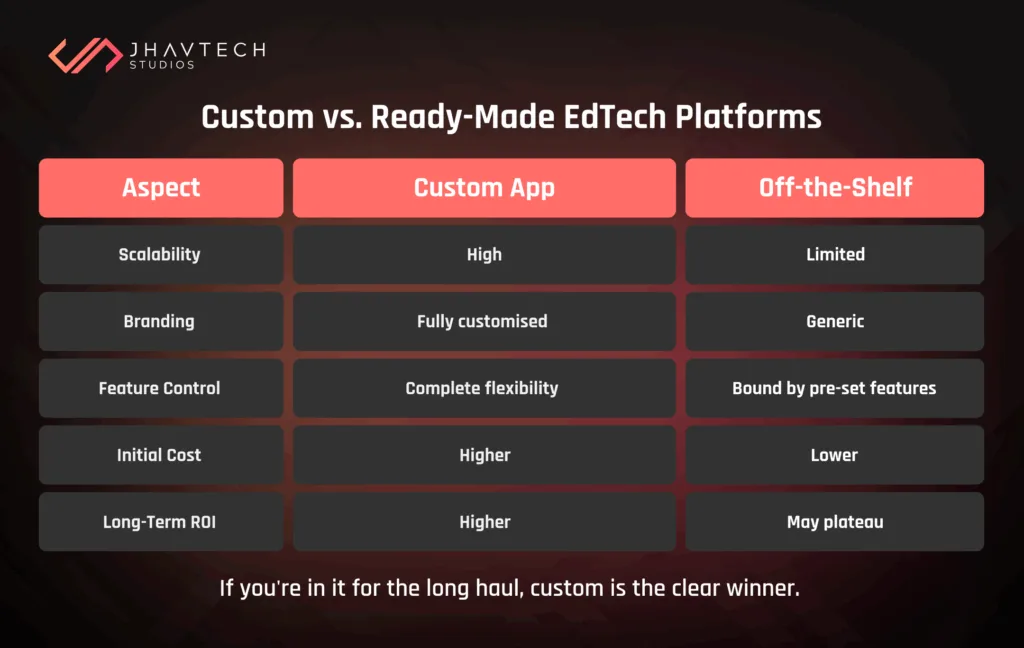Custom Educational Apps: Your Complete Guide to Building a Game-Changer in 2025
 Jason Castillo
Jason Castillo
Education isn’t what it used to be — and that’s a good thing.
In 2025, we’re way past chalkboards and Zoom lectures. Learning has become mobile, personalized, and accessible anytime, anywhere. Whether it’s AI-powered tutoring or AR field trips, today’s education landscape is being reshaped by digital innovation — and custom educational apps are leading the charge.
Students, teachers, schools, professionals, and even toddlers are tapping into smarter, more engaging learning experiences. If you’re an edtech founder, school administrator, or entrepreneur eyeing this booming sector, this blog is your roadmap for building an app that doesn’t just work — it wows.
The Evolution of EdTech
From Chalkboards to Chatbots
Remember the days of dusty chalkboards and overhead projectors? Those are long gone. We’ve moved to interactive smartboards, and now AI chatbots that respond to student queries instantly. Learning is no longer passive — it’s dynamic, engaging, and driven by tech.
Post-COVID EdTech Explosion
COVID-19 pushed global education into the digital realm overnight. Schools scrambled for LMS platforms, universities livestreamed lectures, and parents became part-time teachers. What started as a crisis response evolved into a long-term shift: educational apps are now central to modern learning ecosystems.
The Rise of Mobile Learning
Today’s learners want knowledge on the go. In fact, according to Statista, the global mobile learning market is expected to hit $80.1 billion by 2027. Whether it’s a student reviewing lessons during a commute or a professional upskilling during lunch, mobile-first design has become essential — not optional.
What Are Educational Apps?
Educational apps are digital tools built to enhance teaching, learning, or skill development. And with custom educational apps, you can tailor the experience to suit specific age groups, learning styles, or institutional goals — something generic platforms simply can’t do.
Types of Educational Apps
K–12 Learning Platforms
These often feature animated lessons, interactive quizzes, and parent dashboards. Apps like ABCmouse or Khan Academy Kids make learning fun and manageable for younger students.
Skill-Based Learning & Career Upskilling
Think Coursera, LinkedIn Learning, or industry-specific training platforms. Custom educational apps in this space often include certifications, real-time assessments, and gamified milestones.
Language Learning Apps
Voice recognition, flashcards, grammar games, and community chats help learners practice and retain languages faster — Duolingo is a great benchmark here.
AR/VR-Based Learning
Want to walk through ancient Rome or interact with the human circulatory system? Augmented and virtual reality make it possible — and unforgettable.
Teacher Productivity & Classroom Management Tools
These apps streamline lesson planning, grading, attendance tracking, and communication with parents — freeing up time for real teaching.

Why Invest in Custom Educational App Development in 2025
Engagement Through Gamification
Game mechanics like leaderboards, badges, and rewards aren’t just gimmicks — they work. A study by TalentLMS found that 89% of learners feel more productive when their app includes gamification. Custom educational apps allow you to build these features right into the core experience.
Adaptive Learning and AI
Modern apps use machine learning to personalize content. Struggling with algebra? The app adjusts and delivers easier practice sets. Ready for a challenge? It scales up. This kind of real-time adaptability sets custom apps apart.
Offline Access for Remote Learners
In regions with unstable internet, downloadable lessons and offline test-taking are critical. Jhavtech Studios has built solutions with this in mind — one of our apps helped students in underserved areas prep for exams even without daily internet access.
Data Insights for Teachers & Institutions
Custom educational apps can offer rich analytics dashboards that reveal student performance trends, content engagement stats, and learning gaps — empowering teachers to intervene at the right moment.
Key Features of a High-Impact Educational App
Interactive Lessons – Video tutorials, flashcards, drag-and-drop games, and real-world simulations
Progress Tracking – Dashboards for learners, parents, and teachers to monitor performance
Live Classes – Virtual classrooms with chat, whiteboards, and breakout rooms
Homework & Assessment Tools – Automated grading, personalized feedback, and report generation
Multi-Device Syncing – Seamless continuity between mobile, tablet, and desktop
Push Notifications – Alerts for lessons, deadlines, and motivational nudges
Parent & Teacher Portals – Role-based access for monitoring, insights, and controls
These features can be tailored in ways off-the-shelf products simply can’t match — another key reason to invest in custom educational apps.

EdTech Trends to Watch in 2025
AI Tutors & Chatbot-Based Learning
AI tutors now provide real-time help tailored to each student’s pace and comprehension level. According to HolonIQ, AI will power 47% of edtech platforms by 2026.
Blockchain for Certification
Digital certificates stored on the blockchain offer a tamper-proof way to validate credentials — especially useful for universities and corporate training providers.
Mixed Reality (MR) for Immersive Learning
From virtual labs to historical reconstructions, mixed reality is redefining how learners interact with content.
Bite-Sized Microlearning
Short lessons (5–10 minutes) are ideal for mobile learners and busy professionals. Microlearning improves focus and retention by breaking content into digestible chunks.
Peer-to-Peer Learning Platforms
Forums, collaborative assignments, and peer grading features turn learners into teachers — building stronger engagement and community.
Challenges in Educational App Development
Curriculum Compliance
Ensuring alignment with national or regional education boards like CBSE, IB, or Common Core is essential. Custom educational apps can be designed with curriculum frameworks built-in from the ground up.
Student Engagement
It’s no secret — attention spans are shrinking. Apps must deliver content in highly visual, bite-sized, and interactive formats to keep learners engaged.
Digital Equity
Not all students have reliable internet or modern devices. That’s why lightweight, offline-capable apps that work on older hardware are a must-have — and a key benefit of custom development.
Monetization Models for Educational Apps

Compliance and Data Security in EdTech
Handling student data — especially when minors are involved — is a serious responsibility, no matter where your users are.
For Australian educational institutions and app developers, your platform should comply with:
Australian Privacy Act (1988) — Governs how personal data is collected, used, and stored, including specific protections for children in educational contexts.
APPs (Australian Privacy Principles) — A set of 13 guidelines covering transparency, data security, and user rights.
Online Safety Act (2021) — Focuses on keeping children safe in digital environments, including educational apps.
If you’re also targeting global users, additional standards may apply:
FERPA – U.S. Family Educational Rights and Privacy Act
COPPA – U.S. Children’s Online Privacy Protection Act
GDPR – European Union’s General Data Protection Regulation
To stay compliant across the board, make sure your app includes:
Secure Authentication – Multi-factor login and role-based access
Data Encryption – Protects student records, assessments, and communications
Moderated In-App Messaging – Prevents misuse and protects younger users
Clear Consent Flows – For data collection, especially from minors or their guardians
These are standard features built into every education project we develop at Jhavtech Studios, ensuring your custom educational app is not only engaging — but also responsible and regulation-ready.
Success Story: Building a Learning App with Jhavtech Studios
The Challenge
An education-focused startup in Australia aimed to support underprivileged students — particularly those in rural and regional areas — by developing an offline-capable app that made exam preparation more accessible and engaging.
Our Approach
Collaborated closely with teachers, school administrators, and students to understand real classroom and learning challenges
Designed a lightweight app that works seamlessly in low-bandwidth or no-internet environments
Used clean, user-friendly visuals and simplified English to ensure accessibility for learners with varying literacy levels
Integrated gamified quizzes, progress tracking, and exam-style practice questions tailored to national curriculum standards
Built the app to be scalable and customizable for other educational settings and future language support if needed
The Outcome
Over 40,000 downloads within the first 90 days
Maintained a 4.8-star rating across major app stores
Partner schools reported a significant boost in test preparedness, with some students improving scores by as much as 60%
Teachers highlighted reduced workload and increased student engagement, even in remote classrooms
This is the kind of measurable impact that well-designed custom educational apps — built in collaboration with the right tech partner — can deliver.
Custom vs. Ready-Made EdTech Platforms

How to Launch a Successful Educational App
1. Discovery & Curriculum Planning
Define your users — are they preschoolers, high schoolers, professionals, or educators?
2. Design for Learning
Use age-appropriate content formats, gamified lessons, and intuitive UI/UX design.
3. Beta Test with Educators
Nothing beats real-world feedback. Involve teachers early’
4. Go-To-Market Strategy
Market through school partnerships, social ads, education influencers, and even government learning initiatives.
Why Choose Jhavtech Studios for Your EdTech App Development
Deep Domain Knowledge
At Jhavtech Studios, we go beyond coding — we design experiences rooted in educational psychology, pedagogy, and real-world classroom needs. Our team takes the time to understand how different age groups learn, how motivation and retention work, and what it takes to make educational content truly stick. Whether you’re building a preschool learning app or a professional upskilling platform, we tailor the design and flow to maximize learning outcomes.
Cross-Platform Excellence
We specialize in creating responsive, high-performance custom educational apps that run seamlessly across Android, iOS, tablets, laptops, and web browsers. This ensures students and educators can access your platform regardless of their device — a critical advantage in today’s mixed-device learning environments, especially across Australian schools, universities, and training organizations.
End-to-End Development
We’re with you at every stage — from discovery and UI/UX design to development, testing, deployment, and long-term maintenance. Need curriculum mapping? Built-in assessments? Offline access? We’ll handle the technical complexities so you can focus on the impact. And once your app is live, we support updates, enhancements, and new features as your needs evolve.
Explore our work in the education sector: Jhavtech Studios Portfolio
Final Thoughts…
Education in 2025 is learner-driven, mobile-first, and innovation-rich. Whether you’re building a spelling app for kids, a science simulation for high schoolers, or a career upskilling tool for adults, custom educational apps are your key to real impact.
Jhavtech Studios is ready to help you turn your vision into a powerful, scalable product that changes lives — one lesson at a time. Contact us today and let’s build the future of learning, together.
Frequently Asked Questions
1. How long does it take to build an educational app?
Typically 3–6 months, depending on features and integrations.
2. Can the app align with specific curriculums like the Australian Curriculum or VCE?
Yes! We tailor the design and content structure to meet academic standards.
3. How do I ensure students stay engaged?
Incorporate gamification, AI-driven recommendations, and interactive modules.
4. What if users have limited internet access?
We build apps with offline-first architecture, syncing data when connectivity returns.
5. Can I support multiple languages?
Absolutely. We offer localization and dynamic content switching based on user settings.
Subscribe to my newsletter
Read articles from Jason Castillo directly inside your inbox. Subscribe to the newsletter, and don't miss out.
Written by

Jason Castillo
Jason Castillo
Helping businesses—from startups to enterprises—build and rescue apps and websites at Jhavtech Studios. We transform stalled or messy software projects into clean, scalable digital solutions. Passionate about solving complex tech challenges and bringing great ideas to life.